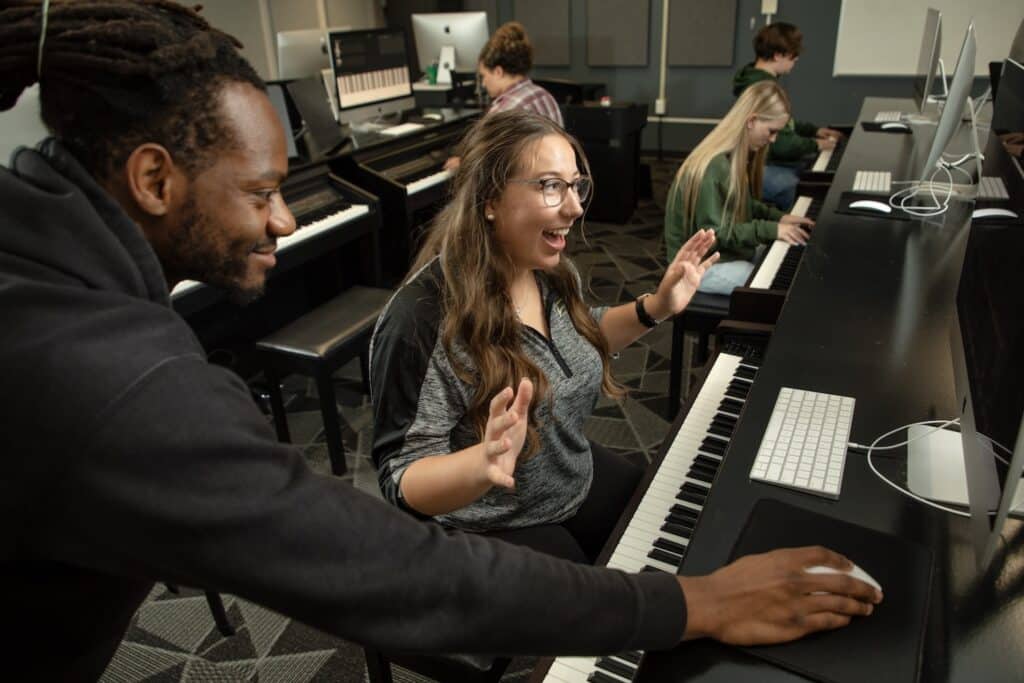The music industry offers a wide range of career paths for individuals interested in performance, songwriting, production and audio technology. A Commercial Music degree provides the training and hands-on experience needed to build a career in this field. Whether you’re interested in performing, writing, producing, teaching, engineering or working behind the scenes, our program at TU helps you build the practical skills and industry knowledge you need to pursue a career in the industry.
What Is a Commercial Music Degree?
A commercial music degree focuses on the practical aspects of music-making, emphasizing contemporary styles and the business acumen necessary for the music industry. Unlike traditional music programs that may only concentrate on classical training, a Commercial Music degree encompasses a broader spectrum, including pop, jazz, rock and hip-hop.
At Tiffin University, the Commercial Music program balances coursework in musicianship, music technology and music business, ensuring students build a set of practical and employable skills. The curriculum is uniquely designed to provide hands-on opportunities, allowing students to engage directly with the music industry through real-world experiences.
Commercial Music Degree Tracks
At TU, students can tailor their Commercial Music studies by choosing from a variety of specialized tracks, each designed to develop specific skill sets aligned with individual career goals.
Commercial Music – Songwriting
This track focuses on helping students write, arrange and produce original music across genres such as pop, rock, R&B, hip-hop and more. You’ll learn to craft lyrics, develop melodies and use music production tools to bring your ideas to life, building a solid foundation in both creative and technical songwriting.
Commercial Music – Studio Production
Ideal for students interested in the technical side of music, this track provides deep training in audio recording, mixing and production techniques. You’ll gain hands-on experience with professional-grade equipment and software, preparing you for work in studios, live settings or as an independent producer.
Commercial Music – Studio Writing
The Studio Writing track is designed for students aiming to compose for film, television, video games and other commercial settings. It emphasizes musicianship and creativity, teaching students how to write engaging scores, cues and themes that enhance storytelling across media platforms.
Commercial Music – Teaching and Performing
This track is perfect for students who want to perform professionally or share their skills through private teaching. You’ll develop advanced performance techniques while also learning how to lead lessons, organize rehearsals and work with a variety of student musicians, preparing for a flexible, multifaceted music career.
Commercial Music Degree Careers
One of the biggest strengths of a commercial music degree is its versatility. Whether you’re interested in performing, composing, live entertainment, film and television, recording studios, education, publishing, artist management, producing or working on the business side of the industry, this degree gives you the foundational skills to explore a wide range of opportunities. Here are a few potential roles you might pursue after earning a Commercial Music degree:
1. A&R Professional
Artists and Repertoire (A&R) professionals scout new talent and help develop an artist’s career from the ground up. They often serve as the bridge between artists and record labels, guiding everything from songwriting to branding.
2. Composer (Film & TV)
Composers write original music that underscores the emotion and pacing of scenes in movies and television shows. Their work enhances storytelling and helps shape the overall tone of a production.
3. Live Sound Engineer
Live sound engineers manage the audio quality during concerts, theater performances and live broadcasts. They set up and operate sound equipment to ensure clear, balanced sound for both performers and audiences.
4. Music Supervisor
Music supervisors are responsible for selecting and licensing music used in films, TV shows, ads and video games. They collaborate with directors and producers to ensure the music supports the emotional and narrative goals of the project.
5. Producer-Songwriter
Producer-songwriters write and produce music for themselves or other artists, often creating songs from concept to final mix. They combine creative and technical skills to craft commercially viable tracks.
6. Recording Engineer
Recording engineers handle the technical side of studio sessions, including microphone placement, signal flow and sound mixing. Their goal is to capture high-quality recordings that meet professional standards.
7. Studio Musician
Studio musicians are highly versatile performers hired to play on recordings across a variety of genres. They are known for their quick learning, technical precision and ability to adapt to different musical styles.
8. Tour Manager
Tour managers organize every detail of an artist’s tour, from travel logistics to venue coordination. They ensure everything runs smoothly so the performers can focus on their show.
9. Private Instructor
Private instructors teach music to individuals or small groups, often focusing on instruments, vocals or songwriting. They personalize lessons to students’ goals, skill levels and learning styles.
10. Sound Designer
Sound designers create and manipulate audio elements for film, television, theater and video games. They develop everything from ambient backgrounds to special effects that bring stories to life.
Earn Your Commercial Music Degree at TU
Tiffin University’s Commercial Music program offers a unique educational experience that sets it apart from other institutions. As the only small college specializing specifically in commercial music, TU’s program is built around a praxial philosophy, which emphasizes learning through doing. This practical, real-world approach helps students become adaptable professionals prepared for a fast-changing music industry.
Students in the program learn and create at Tiffin University’s Performing Arts Lab (The PAL), a 14,000-square-foot facility featuring a professional recording studio, keyboard and production lab and large rehearsal spaces. The PAL supports both academic coursework and extracurricular music opportunities, serving more than 200 students involved in over 20 music ensembles across a wide range of styles.
Whether your passion lies in performance, production or composition, TU offers the space, resources and guidance to help you succeed.
